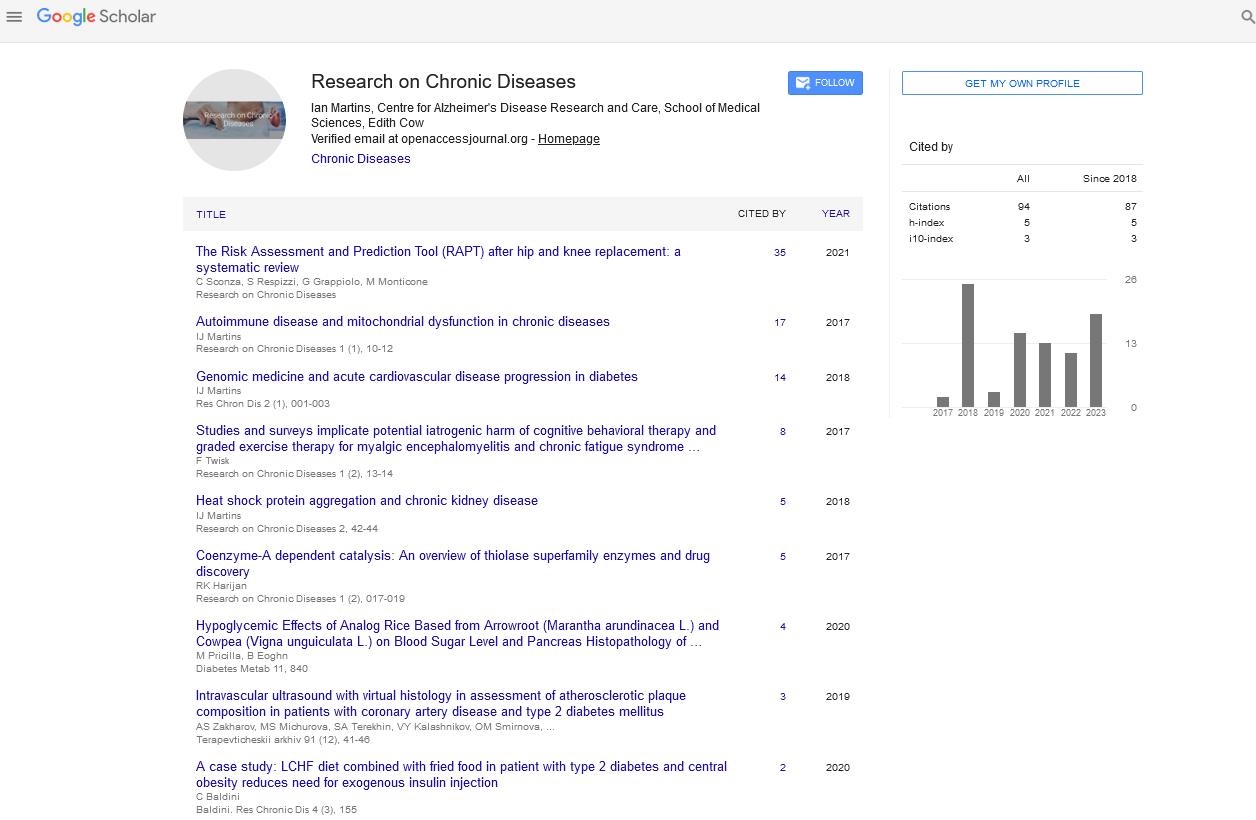Opinion Article - Research on Chronic Diseases (2024) Volume 8, Issue 1
Unveiling the Enigma of Chronic Kidney Disease: Understanding Causes, Stages, Diagnosis, and Therapeutic Paths
- Corresponding Author:
- Daniel G. Whitney
Department of Nephrology, University of Alabama at Birmingham, Birmingham, USA
E-mail: dhit@med.yahoo.com
Received: 08-Jan-2024, Manuscript No. OARCD-24-124713; Editor assigned: 10-Jan-2024, PreQC No. OARCD-24-124713 (PQ); Reviewed: 24-Jan-2024, QC No. OARCD-24-124713; Revised: 01-Feb-2024, Manuscript No. OARCD-24-124713 (R); Published: 08-Feb-2024, DOI: 10.37532/OARCD.2024.8(1).155-157
Introduction
In the intricate realm of human health, the kidneys stand as silent heroes, tirelessly performing vital functions that maintain the body’s balance. However, the silent onset and gradual progression of Chronic Kidney Disease (CKD) present a formidable challenge to individuals and healthcare providers alike. In this comprehensive exploration, we embark on a journey to unravel the complexities of CKD, shedding light on its multifaceted causes, delineating its progressive stages, examining diagnostic approaches, and exploring the evolving landscape of therapeutic interventions.
Causes of chronic kidney disease
Diabetes mellitus: Diabetes is a leading cause of CKD. Prolonged high blood sugar levels can damage the tiny blood vessels in the kidneys, impairing their filtration capacity.
Hypertension (high blood pressure): Uncontrolled high blood pressure places strain on the delicate blood vessels in the kidneys, contributing to kidney damage over time.
Glomerulonephritis: Inflammation of the kidney’s filtering units, called glomeruli, can result in scarring and impaired kidney function.
Polycystic Kidney Disease (PKD): An inherited condition characterized by the formation of cysts within the kidneys, PKD can lead to kidney enlargement and functional decline.
Stages of chronic kidney disease
CKD is classified into stages based on the estimated Glomerular Filtration Rate (eGFR), which reflects the kidneys’ filtering capacity. The stages range from stage 1 (mild) to stage 5 (end-stage renal disease).
• Stage 1: Kidney damage with normal or increased eGFR (≥ 90 mL/min/1.73 m²).
• Stage 2: Mild reduction in eGFR (60-89 mL/min/1.73 m²).
• Stage 3: Moderate reduction in eGFR (30-59 mL/min/1.73 m²).
• Stage 4: Severe reduction in eGFR (15-29 mL/min/1.73 m²).
• Stage 5: End-stage renal disease (eGFR <15 mL/min/1.73 m² or dialysis).
Symptoms and complications
In the early stages, CKD may be asymptomatic. As the disease progresses, symptoms may include fatigue, swelling, changes in urine output, nausea and difficulty concentrating.
Complications of CKD include anemia, bone mineral disorders, fluid overload, electrolyte imbalances and an increased risk of cardiovascular disease.
Description
Imaging studies
Ultrasound: Imaging the kidneys using ultrasound can reveal structural abnormalities, cysts, or signs of obstruction.
CT scan or MRI: These imaging modalities may be used for more detailed visualization of the kidneys and surrounding structures.
Kidney biopsy
In certain cases, a kidney biopsy may be performed to obtain a tissue sample for microscopic examination. This is typically reserved for cases where the cause of CKD is unclear or to assess the extent of kidney damage.
Treatment strategies for chronic kidney disease
The management of CKD involves addressing the underlying causes, controlling symptoms and implementing lifestyle modifications to slow disease progression. In advanced stages, treatments may focus on preparing for renal replacement therapies such as dialysis or kidney transplantation.
Blood pressure management
Maintaining blood pressure within the target range is crucial in slowing the progression of CKD. Medications such as Angiotensin Converting Enzyme (ACE) inhibitors or Angiotensin II Receptor Blockers (ARBs) are commonly prescribed.
Diabetes control: Individuals with diabetes and CKD should focus on tight blood sugar control. Lifestyle modifications and medications may be prescribed to achieve and maintain target blood glucose levels.
Medication adjustments: Certain medications that can worsen kidney function may be adjusted or discontinued. Close monitoring of drug dosages is essential.
Protein restriction: In later stages of CKD, reducing protein intake may help manage symptoms and slow disease progression. However, dietary modifications should be guided by a healthcare professional.
Phosphorus and potassium management: Monitoring and controlling levels of phosphorus and potassium in the diet is crucial, especially in advanced stages of CKD.
Cardiovascular disease prevention: Given the increased risk of cardiovascular complications in CKD, lifestyle modifications such as a heart-healthy diet, regular exerciseand smoking cessation are emphasized.
Dialysis and transplantation
In end-stage renal disease, when kidney function is severely compromised, renal replacement therapies such as hemodialysis, peritoneal dialysis, or kidney transplantation become viable options.
Emerging research and innovations
The landscape of CKD research is dynamic, with ongoing efforts to advance our understanding of the disease and explore innovative approaches to treatment. Key areas of research include:
Biomarkers for early detection
Identifying novel biomarkers that can facilitate early detection of CKD and predict disease progression is a focus of research.
Precision medicine
Advancements in genomics aim to identify genetic factors that influence an individual’s risk of developing CKD and guide personalized treatment approaches.
Regenerative medicine
Investigating regenerative therapies, such as stem cell-based interventions, to promote the repair and regeneration of damaged kidney tissue.
Novel drug therapies
Research is ongoing to develop targeted drug therapies that can mitigate inflammation, fibrosis and other processes contributing to CKD progression.
Remote monitoring and telehealth
The integration of remote monitoring technologies and telehealth platforms aims to enhance the management of CKD by allowing for real-time tracking of key indicators and facilitating timely interventions.
Conclusion
Chronic kidney disease, with its insidious onset and progressive nature, poses a significant health challenge worldwide. As we navigate the complexities of CKD, from understanding its diverse causes to implementing evolving treatment strategies, the imperative for awareness, early detection, and ongoing research cannot be overstated.
The journey toward improved outcomes for individuals with CKD involves not only medical advancements but also a holistic approach that encompasses lifestyle modifications, patient education, and the integration of innovative technologies. By fostering a deeper understanding of CKD, supporting ongoing research initiatives, and promoting comprehensive care, we can strive for a future where the impact of this silent epidemic is minimized and individuals affected by CKD can lead healthier and more fulfilling lives.
